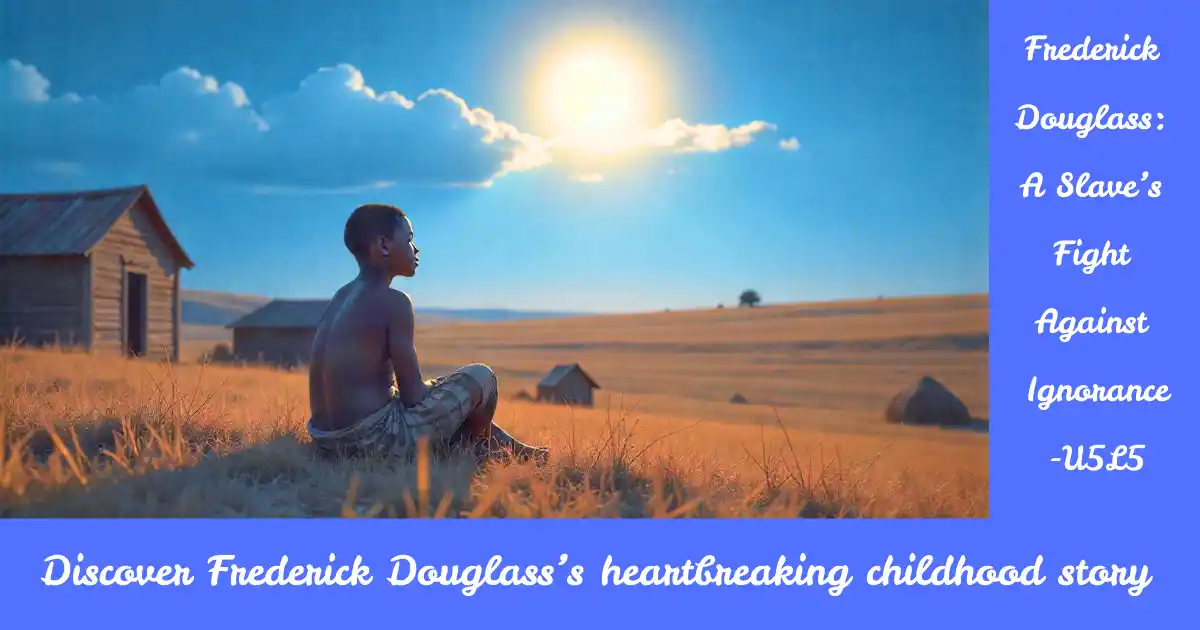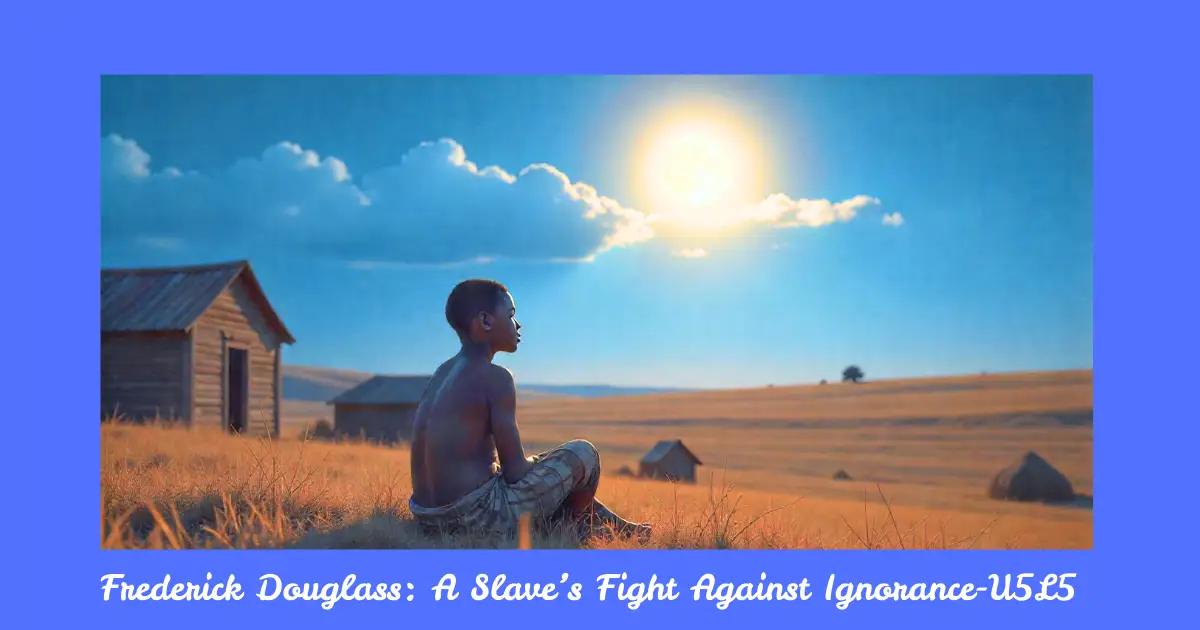Frederick Douglass, one of the greatest leaders in the fight against slavery, was born into bondage in Maryland around 1818. In his autobiography Narrative of the Life of Frederick Douglass, an American Slave, he reveals the harsh realities of slavery. This passage from Chapter I highlights his early struggles — ignorance about his age, separation from his mother, and the pain of losing her without ever truly knowing her.

These experiences shaped his lifelong commitment to justice and equality.
Martin Luther King’s Timeless Call for Freedom & Justice U4L1
Frederick Douglass:
Frederick Douglass, an important leader in the fight against slavery, was born into slavery around 1818 in Talbot County, Maryland. He became very well known, advising presidents and giving talks to many people about various issues like women’s rights and Irish self rule.
Douglass wrote several books about his life, including his famous autobiography, Narrative of the Life of Frederick Douglass, an American Slave. Here is an excerpt from this book:
Chapter I
I was born in Tuckahoe, near Hillsborough, and about twelve miles from Easton, in Talbot county, Maryland. I have no accurate knowledge of my age, never having seen any authentic record containing it. By far the larger part of the slaves know as little of their ages as horses know of theirs, and it is the wish of most masters within my knowledge to keep their slaves thus ignorant.
I do not remember to have ever met a slave who could tell of his birthday. They seldom come nearer to it than planting-time, harvest-time, cherry-time, spring-time, or fall-time. A want of information concerning my own was a source of unhappiness to me even during childhood. The white children could tell their ages.
I could not tell why I ought to be deprived of the same privilege. I was not allowed to make any inquiries of my master concerning it. He deemed all such inquiries on the part of a slave improper and impertinent, and evidence of a restless spirit. The nearest estimate I can give makes me now between twenty-seven and twenty-eight years of age. I come to this, from hearing my master say, sometime during 1835, I was about seventeen years old.
My mother was named Harriet Bailey. She was the daughter of Isaac and Betsey Bailey, both colored, and quite dark. My mother was of a darker complexion than either my grandmother or grandfather.
My father was a white man. He was admitted to be such by all I ever heard speak of my parentage. The opinion was also whispered that my master was my father, but of the correctness of this opinion, I know nothing, the means of knowing was withheld from me. My mother and I were separated when I was but an infant- before I knew her as my mother.
It is a common custom, in the part of Maryland from which I ran away, to part children from their mothers at a very early age. Frequently, before the child has reached its twelfth month, its mother is taken from it, and hired out on some farm a considerable distance off, and the child is placed under the care of an old woman, too old for field labor.
For what this separation is done, I do not know, unless it is to hinder the development of the child’s affection toward its mother, and to blunt and destroy the natural affection of the mother for the child.
This is the inevitable result.
I never saw my mother, to know her as such, more than four or five times in my life; and each of these times was very short in duration, and at night. She was hired by a Mr. Stewart, who lived about twelve miles from my home. She made her journeys to see me in the night, travelling the whole distance on foot, after the performance of her day’s work.
She was a field hand, and a whipping is the penalty of not being in the field at sunrise, unless a slave has special permission from his or her master to the contrary-a permission which they seldom get, and one that gives to him that gives it the proud name of being a kind master.
I do not recollect of ever seeing my mother by the light of day. She was with me in the night. She would lie down with me, and get me to sleep, but long before I waked she was gone. Very little communication ever took place between us. Death soon ended what little we could have while she lived, and with it her hardships and suffering. She died when I was about seven years old, on one of my master’s farms, near Lee’s Mill.
I was not allowed to be present during her illness, at her death, or burial. She was gone long before I knew anything about it. Never having enjoyed, to any considerable extent, her soothing presence, her tender and watchful care, I received the tidings of her death with much the same emotions I should have probably felt at the death of a stranger.
[This passage/content is taken from the National Curriculum and Textbook Board (NCTB), Bangladesh English textbook for educational purposes only.]
© NCTB Bangladesh. All rights reserved to the original publisher.

Top 20 Essential Adjective Examples in Real Sentences
Important Words & Phrases (with Bangla meaning)
| Word/Phrase | Bangla Meaning |
| Slavery | দাসপ্রথা |
| Autobiography | আত্মজীবনী |
| Narrative | বর্ণনা, কাহিনি |
| Authentic record | প্রকৃত নথি |
| Ignorant / Ignorance | অজ্ঞ / অজ্ঞতা |
| Deprived | বঞ্চিত |
| Privilege | বিশেষ অধিকার |
| Inquiry | অনুসন্ধান, প্রশ্ন |
| Improper | অনুচিত |
| Impertinent | বেয়াদব, অসভ্য |
| Restless spirit | অস্থির মনোভাব |
| Estimate | আনুমানিক হিসাব |
| Parentage | পিতা মাতার পরিচয় |
| Complexion | গায়ের রং |
| Whispered | ফিসফিস করে বলা |
| Speculation | অনুমান, গুজব |
| Separated | আলাদা করা |
| Custom | প্রথা, রীতি |
| Affection | স্নেহ, মমতা |
| Blunt | ভোঁতা করা, দুর্বল করা |
| Destroy | ধ্বংস করা |
| Inevitable | অনিবার্য |
| Duration | স্থায়িত্ব, সময়কাল |
| Field hand | জমিতে কাজ করা শ্রমিক/দাস |
| Whipping | চাবুক মারা, প্রহার |
| Permission | অনুমতি |
| Contrary | বিপরীত |
| Tidings | সংবাদ |
| Stranger | অপরিচিত ব্যক্তি |
| Hardships | কষ্ট, দুর্দশা |
| Suffering | যন্ত্রণা, দুঃখ |
| Childhood | শৈশব |
| Slave master | দাস-মালিক |
| Plantation | দাসদের চাষের ক্ষেত |
| Burial | দাফন, সমাধি |
| Soothing presence | শান্তিদায়ক উপস্থিতি |
| Tender care | মমতাময় যত্ন |
| Watchful care | সতর্ক সেবা |
| Deemed | বিবেচনা করা |
| Estimate of age | বয়সের আনুমানিক হিসাব |
| Infancy | শৈশবকাল (শিশু অবস্থা) |

Frederick Douglass | Accomplishments, Education, Early
Paragraph-wise Bangla Explanation:
Paragraph 1 (Birth and ignorance about age)
ফ্রেডেরিক ডগলাস জানান, তিনি জন্মেছিলেন মার্কিন যুক্তরাষ্ট্রের মেরিল্যান্ড অঙ্গরাজ্যের টাকাহো নামক জায়গায়। কিন্তু তিনি কখনও নিজের বয়স জানতেন না। কারণ, প্রভুরা ইচ্ছাকৃতভাবে দাসদের জন্ম তারিখ বা বয়সের কোনো সঠিক রেকর্ড রাখত না এবং তাদের এ বিষয়ে অজ্ঞ রেখেই দাসত্ব বজায় রাখতে চাইত। ডগলাস বলেন, দাসরা তাদের জন্মদিন সম্পর্কে ঠিক ততটাই অজ্ঞ, যতটা অজ্ঞ ঘোড়া তাদের বয়স সম্পর্কে।
শৈশবে তিনি কষ্ট পেতেন, যখন দেখতেন শ্বেতাঙ্গ শিশুরা গর্ব করে তাদের বয়স বা জন্মদিন বলতে পারে, অথচ তিনি কিছুই জানেন না। এটি তাকে দুঃখিত করত এবং মনে হতো, তিনি এক অযৌক্তিক বঞ্চনার শিকার।
Paragraph 2 (Restriction on asking about age)
ডগলাস ব্যাখ্যা করেন যে, বয়স সম্পর্কে প্রশ্ন করাও ছিল দাসদের জন্য নিষিদ্ধ। যদি কোনো দাস তার প্রভুর কাছে গিয়ে নিজের বয়স সম্পর্কে জানতে চাইত, প্রভু সেটিকে ‘অসন্মানজনক’ এবং ‘অশোভন’ আচরণ হিসেবে গণ্য করত। তাদের চোখে এটি ছিল দাসদের বিদ্রোহী বা অস্থির মানসিকতার প্রমাণ। ফলে দাসদের শিক্ষার বা আত্ম-চেতনার সব ধরনের প্রয়াস ইচ্ছাকৃতভাবে দমন করা হতো। ডগলাস নিজের বয়স অনুমান করেছিলেন প্রভুর কথোপকথন থেকে, যেখানে ১৮৩৫ সালে তাকে প্রায় সতেরো বছর বয়সী বলা হয়েছিল।
Paragraph 3 (Mother’s background and father’s identity)
ডগলাসের মা ছিলেন হ্যারিয়েট বেইলি। তিনি ছিলেন কৃষ্ণাঙ্গ নারী, এবং তার গায়ের রং দাদা-দাদীর তুলনায় আরও গাঢ় ছিল। অন্যদিকে, ডগলাসের বাবার পরিচয় কখনো স্পষ্টভাবে জানানো হয়নি। তবে অনেকেই স্বীকার করত যে তার বাবা একজন শ্বেতাঙ্গ। আবার অনেকে সন্দেহ করত যে তার প্রভুই হয়তো তার বাবা ছিলেন। কিন্তু প্রভুরা কখনো এসব বিষয়ে দাস সন্তানদের জানাতে চাইত না, কারণ এতে তাদের আত্মপরিচয়ের বোধ তৈরি হতো এবং দাসত্বের বন্ধন দুর্বল হয়ে পড়তে পারত।
Paragraph 4 (Separation from mother – cruelty of slavery)
ডগলাস ছোটবেলাতেই মায়ের কাছ থেকে বিচ্ছিন্ন হয়ে যান। এটি ছিল মেরিল্যান্ডের প্রচলিত এক নিষ্ঠুর প্রথাভ শিশুদের খুব অল্প বয়সেই মায়ের কাছ থেকে আলাদা করে দেওয়া হতো। এর উদ্দেশ্য ছিল মা-সন্তানের মধ্যে স্বাভাবিক স্নেহ ও আবেগকে দুর্বল করে দেওয়া, যাতে দাসরা পরিবার বা ভালোবাসার বন্ধনে আবদ্ধ না হয়। ডগলাস বলেন, তিনি তার মাকে জীবনে মাত্র চার-পাঁচ বার দেখেছিলেন, তাও রাতের আঁধারে।
তার মা বারো মাইল হেঁটে আসতেন কাজ শেষ করার পর, কেবল সন্তানের সঙ্গে কিছুক্ষণের জন্য থাকার জন্য। কিন্তু ভোর হওয়ার আগেই তাকে আবার চলে যেতে হতো। প্রভুর অনুমতি ছাড়া এ ধরনের সাক্ষাৎ ঝুঁকিপূর্ণ ছিল, কারণ অনুপস্থিত থাকলে প্রভুরা চাবুক মারত।
Paragraph 5 (Mother’s death and emotional impact)
ডগলাসের মা মারা যান, যখন তার বয়স মাত্র সাত বছর। তার অসুস্থতা, মৃত্যু কিংবা দাফনে তাকে থাকতে দেওয়া হয়নি। ফলে তিনি মায়ের মৃত্যুর সময় কাছে থাকতে পারেননি, তার কোনো সান্ত্বনা পাননি। জীবনে কখনও মায়ের স্নেহময় যত্ন বা সুরক্ষা তিনি প্রকৃতভাবে উপভোগ করেননি। তাই তার মৃত্যুর সংবাদ পেয়ে তিনি যেন কোনো অপরিচিত মানুষের মৃত্যুর খবর শুনেছেন, এমন অনুভূতি হয়েছিল। এ থেকে বোঝা যায়, দাসপ্রথা কেবল দাসদের শ্রম শোষণই করত না, বরং তাদের স্বাভাবিক পারিবারিক ও আবেগিক সম্পর্ককেও ধ্বংস করত।
সারসংক্ষেপ:
ডগলাসের এই আত্মজীবনী থেকে স্পষ্ট বোঝা যায় যে, দাসপ্রথা শুধু শারীরিক শোষণ নয়, বরং মানসিক ও সামাজিকভাবে দাসদের চরমভাবে ভেঙে দিত। বয়স সম্পর্কে অজ্ঞতা, মায়ের থেকে বিচ্ছিন্নতা, বাবার পরিচয় লুকানো এসবই ছিল দাসদের মানবিক পরিচয় ও আবেগ ধ্বংস করার একটি কৌশল। এই শৈশব অভিজ্ঞতাই ডগলাসকে আজীবন দাসপ্রথার বিরুদ্ধে লড়াই করার মানসিক শক্তি জুগিয়েছে।
Relevant Historical Context:
- Frederick Douglass (1818–1895) ছিলেন দাসপ্রথা বিরোধী আন্দোলনের অন্যতম প্রধান নেতা।
- আমেরিকায় ১৮শ-১৯শ শতকে দাসদের জন্মতারিখ জানানো হতো না, কারণ প্রভুরা চাইত না তারা নিজের পরিচয় ও অধিকার সম্পর্কে সচেতন হোক।
- সন্তানদের মায়ের কাছ থেকে আলাদা করে দেওয়া ছিল দাসপ্রথার একটি অমানবিক রীতি, যাতে মা-সন্তানের সম্পর্ক দুর্বল হয়ে যায়।
Literary Terms:
- Autobiography (আত্মজীবনী): লেখক নিজের জীবনের কাহিনি নিজেই লিখেছেন।
- Imagery (চিত্রকল্প): ডগলাস তার মায়ের রাতের আঁধারে দেখা করার বর্ণনা দিয়েছেন, যা পাঠকের মনে জীবন্ত দৃশ্য তৈরি করে।
- Irony (বিরোধাভাস): শ্বেতাঙ্গ শিশুরা জন্মদিন উদযাপন করে, অথচ দাস শিশুদের জন্মদিন জানতেও দেওয়া হতো না।
Questions:
1. How did Douglass feel about not knowing his age?
2. Why did Frederick Douglass not know who his father was, and why was there speculation that his master might have been his father?
3. What references to racism did Douglass make in his writing?
4. How did Douglass feel about his mother’s passing?
5. How do you think Douglass’s early experiences shaped his views on slavery?

